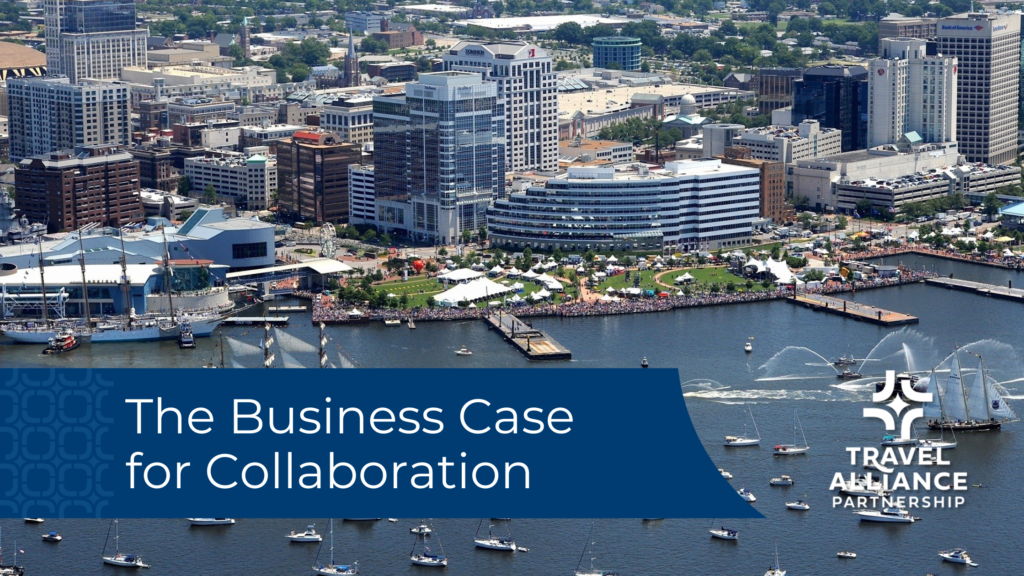The Business Case for Collaboration
I am a huge believer in co-opetition––where perceived competitors cooperate and come together to create something bigger together than they could do on their own. This type of collaboration makes the biggest impact. The guests on my podcast Destination on the Left believe it too. I have been learning from my guests with countless stories of successful collaborations and best practices for what made them successful. I also have been formally studying collaboration through research studies. Looking at both the data and the hundreds of conversations I’ve had with tourism marketing professionals on the podcast, we see the business case for collaboration emerge.

Collaboration Data
While it might seem intuitive that collaborators are avoiding working with organizations who provide similar products and services to the same audience, we were surprised to see that the opposite is true. In our 2021 Rising Tide study, 76% of survey respondents say their organization collaborated with direct competitors, while 52% collaborated with organizations offering different products or services.
The number of organizations that respondents have collaborated with may be playing a factor in the prevalence of direct-competitor collaborations. Those who have collaborated with more than five organizations are far more likely to have collaborated with direct competitors (73%) compared to those who haven’t (29%). Perhaps a larger number of collaborations simply increases the likelihood that organizations will collaborate with a direct competitor sooner or later, but the gap is striking.
Experience also may play a role here. Respondents with the most collaboration experience are the most likely to embrace collaboration with direct competitors. 84% of those who say they have extensive experience have collaborated with direct competitors, compared to only 57% of those who say they don’t have much personal experience.
And regardless of their attitudes about collaboration, those with more than 30 years of experience in the travel, tourism, and hospitality industry are more likely than those with less than 10 years of experience to collaborate with direct competitors regardless of the age of the respondent.
Benefits of Collaboration
If you aren’t collaborating with competitors, you may be missing out on tremendous opportunities that others are already tuned into. Respondents whose organizations have collaborated with direct competitors are more likely to say they have gained every one of the benefits we explored in our survey:
- Increased innovation
- Improved relevance to customers
- Economic gains
- Improved brand identity
- Increased levels of trust in the organization by stakeholders, customers, and partners.
Those who have collaborated with direct competitors are more likely to rate their collaborations as being extremely valuable––both for their organizations and for their own work and expertise.
Competing Destinations Collaborate for Broader appeal – Norfolk/Virginia Beach
In March 2020 among lockdowns and travel restrictions. Kurt Krause, President & CEO of Visit Norfolk (DOTL Episode 342) noted it was tough to figure out when his destination marketing organization should start to market again. But rather than sit idle, his team got ready for when the timing was right. They assessed the strengths of the area and the changing desires of travelers. Kurt recognized that the area had lots of water and great history. They had outdoor activities and attractions and there was always demand from Memorial Day to Labor Day for people seeking the beach, water, and the Chesapeake Bay. Kurt knew that eventually people would get tired of being locked up in their houses. He also recognized that Norfolk was one gas tank away from 72 million people. The traveler sentiment studies published at the time indicated that 30-40% of Americans wanted to travel in the coming 6 months. Kurt saw the opportunity that 30-40% of 72 million people offered.
A Collaboration is Born
With this information, an idea for a collaborative marketing campaign was born. It was unheard of, Norfolk would collaborate with Virginia Beach. These two destinations had a long rivalry as competing destinations. But this opportunity promised more than enough visitors for both destinations. Each destination contributed $500,000 dollars, a combined one million dollar campaign would deliver more reach than each destination could have on their own.
Virginia Beach offered an Atlantic coast beach resort experience with lots of things to do on the beach. Norfolk offered an urban waterfront, arts, culture, restaurants, and history. The two destinations felt that together they were better, so they put a campaign together set to the track of, Etta James song Together at Last. The name of the campaign was a twist that finally Virginia Beach and Norfolk are together at last, but it was more intended for families, couples, and friends who were together at last.
The campaign recognized that people were going to be anxious to get out, to exhale, to breathe, and get some fresh air. They weren’t going to travel internationally, and they weren’t going to be comfortable on a plane. Traditionally people travel south to the beach, rarely do they go from a Southern location up to the beach. So, the campaign focused on Pittsburgh, Columbus, Philadelphia and Baltimore.
Collaboration Results
The Together at Last campaign was very successful to the point that the two destinations decided to extend it by one month. The $1 million investment into the campaign generated $6 million in hotel room sales. According to STR, a service that tracks occupancy for markets across the US, the Norfolk Virginia Beach market, which is one of the top 25 markets in the country, led the country as the number one market all summer long for 20 consecutive weeks.
Author
Related Posts
Collaboration Drives Sustainable Tourism
Sustainable tourism has growing importance in the world of travel and tourism. As destinations grow in popularity, they need to collaborate closely with residents, local…
Marketing for Group Travel: Building Solid Relationships with Tour Operators
Group travel is a significant segment of the tourism market, and if you want to see those buses pulling up to the curb and filling…
